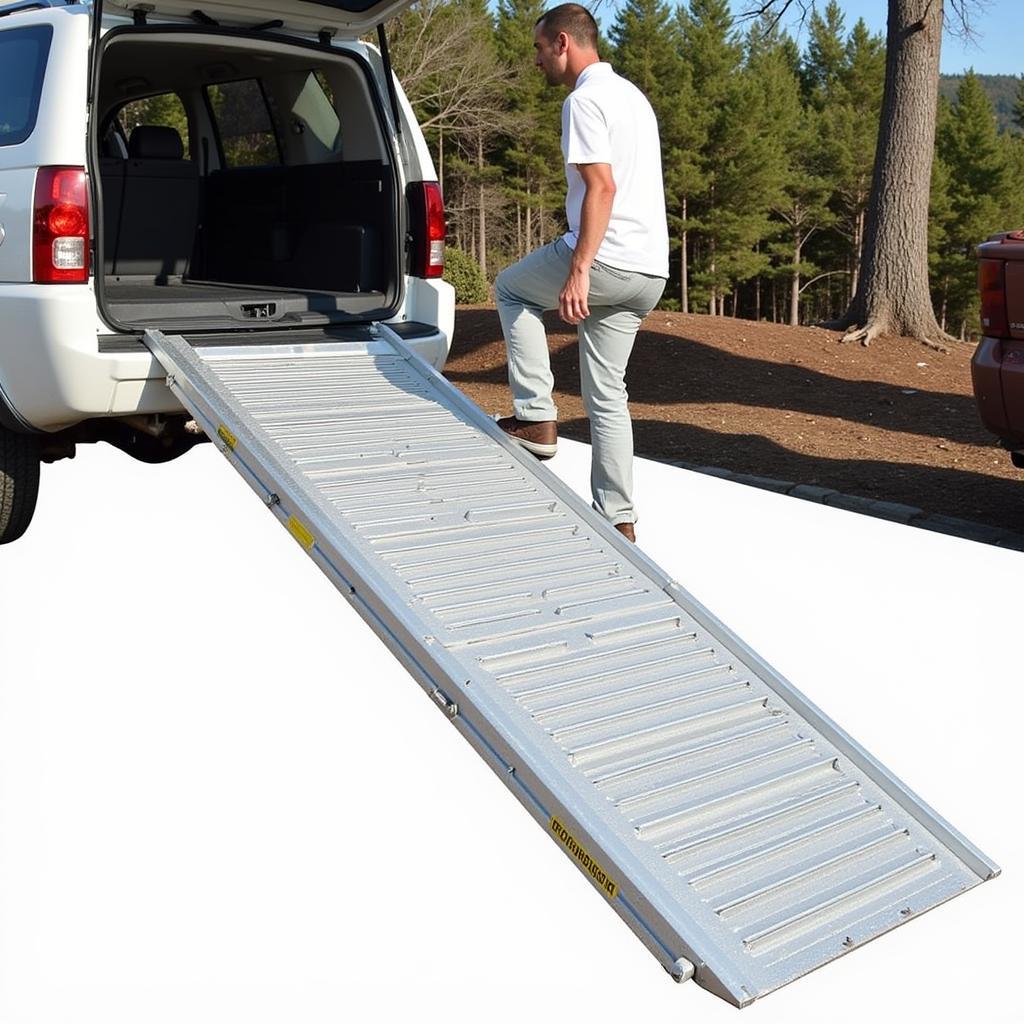When it comes to transporting vehicles, a car hauler trailer is an essential tool for car dealerships, auto transport companies, and even individuals who need to move their vehicles. However, loading and unloading cars onto a trailer can be a challenging task, especially if you’re dealing with a heavy or low-clearance vehicle. That’s where Ramps For Car Haulers come in.
Ramps are crucial for providing a safe and efficient way to load and unload vehicles. They provide a stable, level surface for cars to drive onto the trailer, eliminating the risk of damage to the vehicle or the trailer. In this article, we’ll delve into the world of ramps for car haulers, covering everything from different types and features to choosing the right ramps for your needs.
Types of Ramps For Car Haulers
Ramps for car haulers come in various shapes and sizes, each designed for specific applications. Understanding the different types is key to choosing the right ramp for your particular car hauler and needs.
1. Steel Ramps:
Steel ramps are the most common type of car hauler ramp. They are durable, affordable, and capable of supporting heavy loads. Steel ramps are typically made from either angle iron or channel iron, which provides excellent strength and stability.
2. Aluminum Ramps:
 Lightweight Aluminum Ramps For Car Haulers
Lightweight Aluminum Ramps For Car Haulers
Aluminum ramps offer the advantage of being lighter than steel ramps, making them easier to transport and maneuver. They are also resistant to corrosion, making them ideal for use in harsh environments. However, aluminum ramps may be more expensive than steel ramps.
3. Folding Ramps:
Folding ramps are a popular choice for car haulers due to their convenient design. They can be folded for compact storage and easily transported when not in use. Folding ramps are typically available in both steel and aluminum.
Choosing the Right Ramps For Your Needs
Choosing the right ramps for your car hauler depends on several factors, including:
- The weight of the vehicles you plan to transport: Heavier vehicles require heavier-duty ramps.
- The length of the trailer: Longer trailers often require longer ramps.
- The height of the trailer: Higher trailers will need ramps with a steeper incline.
- The type of surface you will be using the ramps on: Ramps need to be compatible with the terrain and ensure a secure and stable base.
- Your budget: Ramps come in a wide range of prices, depending on their size, material, and features.
Features to Consider When Choosing Ramps
- Load Capacity: The load capacity of the ramps should be greater than the weight of the heaviest vehicle you plan to transport.
- Length: Make sure the ramps are long enough to reach from the ground to the trailer bed.
- Width: The ramps should be wide enough to accommodate the width of the vehicle’s tires.
- Incline: The angle of the ramp’s incline should be gradual enough to allow vehicles to drive on and off safely.
- Safety Features: Look for ramps with safety features such as non-slip surfaces, side rails, and tie-down points.
Safety Tips For Using Ramps
- Always inspect the ramps before each use for damage or wear.
- Use the ramps on a solid, level surface.
- Drive slowly and carefully when using ramps.
- Never attempt to load or unload a vehicle onto a ramp that is not properly secured.
- Use safety equipment, such as work gloves and safety glasses, when handling ramps.
Conclusion
Ramps are essential components for car haulers, ensuring safe and efficient loading and unloading. By understanding the different types of ramps and their features, you can choose the best ones to meet your specific needs. Remember to prioritize safety and follow best practices when using ramps.
FAQ
1. What is the average length of a car hauler ramp?
The average length of a car hauler ramp varies depending on the size of the trailer and the vehicle being transported. Typically, ramps range from 8 to 16 feet in length.
2. How do I know what load capacity I need for my ramps?
The load capacity of your ramps should be greater than the weight of the heaviest vehicle you plan to transport. Consult the manufacturer’s specifications for the ramps to determine their maximum load capacity.
3. Are ramps for car haulers easy to use?
Yes, most ramps for car haulers are designed for ease of use. They are lightweight, portable, and have features like non-slip surfaces for added safety. However, it’s still important to follow safety procedures and be cautious when using ramps.
4. Can I use ramps on uneven surfaces?
It’s not recommended to use ramps on uneven surfaces as this could compromise stability and safety. Ensure the surface is level and solid before using the ramps.
5. What is the average price of ramps for car haulers?
The price of ramps can vary depending on the size, material, and features. On average, ramps for car haulers can cost anywhere from $100 to $500 or more.
Do you have any more questions about ramps for car haulers?
Need professional support? Our team of experts is always ready to assist you.
Contact us today:
WhatsApp: +1(641)206-8880
Email: [email protected]
Address: 276 Reock St, City of Orange, NJ 07050, United States.
